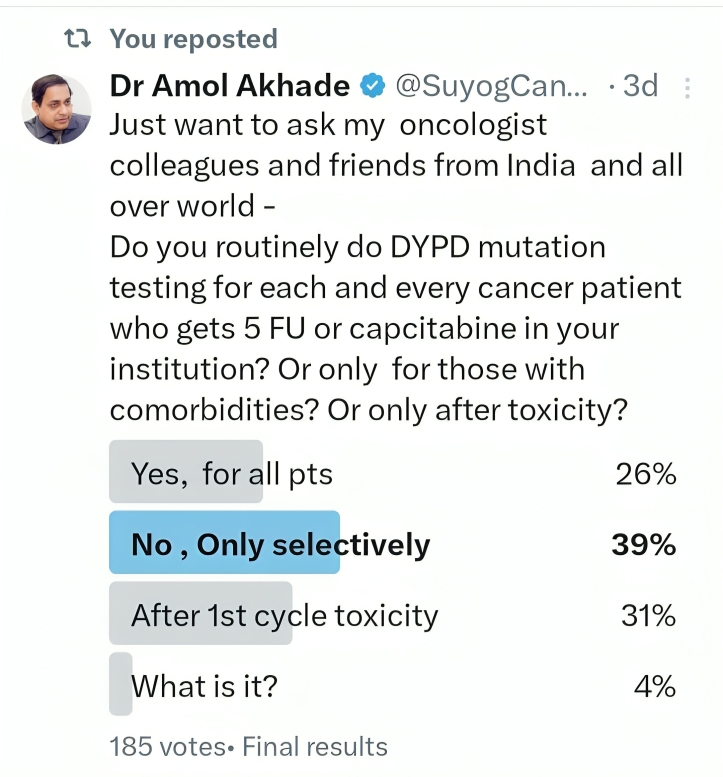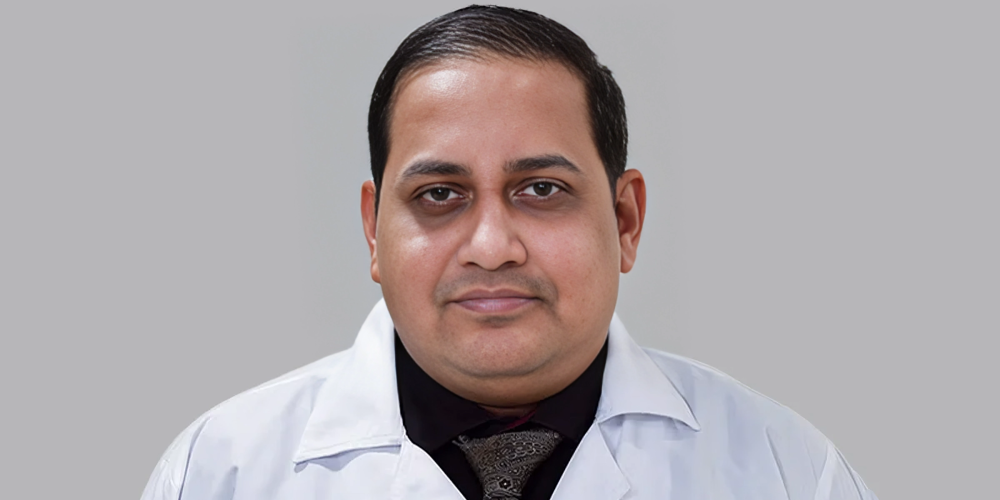Amol Akhade, Senior consultant medical oncologist and hemato-oncologist at Suyog Cancer Clinics and Reliance Hospitals, shared a post on LinkedIn:
“The results of an online survey on oncologists’ perspectives on DYPD mutation testing before using drugs like Capecitabine and 5 FU, reveal that only 26% incorporate it routinely for all patients.
185 oncologists participated in this survey.
The majority opt for selective testing, typically for individuals with comorbidities, the elderly, or post-toxicity in the initial treatment cycle, despite its inclusion in ASCO guidelines.
Several factors contribute to this trend as per discussion with oncologists on social media during this survey-
- Cost plays a significant role, as the test may not be covered by insurance in various regions. The cost in India varies from 10000 to 15000 INR.
In India, government insurance excludes coverage. Similarly, insurance coverage discrepancies exist in the USA and other high-income countries also. - In India, uncertainty arises regarding whether the test encompasses all DYPD variants specific to local ethnicities. The diverse ethnic landscape within India poses challenges in ensuring comprehensive testing. Some of the oncologists feel that test available does not actually co relate with toxicity risk for local population.
- Availability poses a barrier in certain low- and middle-income countries where the test is not even accessible.
- Additionally, lengthy turnaround times (average 7 to 10 days In India in tier one cities) for testing contribute to prescribing decisions without the test, mainly in advanced disease conditions, where every day matters, for patients.
- Managing toxicity in healthier patients through means like growth factors and good supportive care is a viable option. Especially considering the low frequency of homozygous variants leading to severe toxicity, some of the oncologists opt for this path instead of doing the test in each and every patient.
Of course, this is risky trade, and they opt to discuss the risk with the patient before starting these drugs.
Can this dilema be solved if cost comes down?
The potential increase in test uptake if costs decrease is plausible. However, quantifying the impact in countries like India and other lower-middle-income countries remains complex as we don’t know how much lower the cost needs to be for the test to be cost effective and value added.
Ideally government insurance should cover this (so that patients get it for free), but this is very unlikely to occur.
So, to conclude, even if such online surveys have limitations, it reflects the fact that dilemma persists amongst oncologist whether to conduct the test, despite guideline recommendations.
Real-world challenges often diverge from ideal guidelines, showcasing the complexity of clinical decision-making in real world practice.
Sometimes, it is not completely black or white and the answer is somewhere in between. ASCO, Vinod Scaria, Bhawna Sirohi, Dr. Amrit Kaur Kaler and Anu Acharya.”

Dr. Amol Akhade is a senior consultant medical oncologist and hemato-oncologist. He has received his super specialization training in hemato-oncology and medical oncology from Tata Memorial Hospital. He specialises in chemotherapy for hematological cancers as well as solid tumors. He also specialises in allogenic and autologous bone marrow transplant. Currently, he is a Consultant Medical Oncologist at Suyog Cancer Clinics and Reliance Hospitals.
More posts featuring, Amol Akhade.
